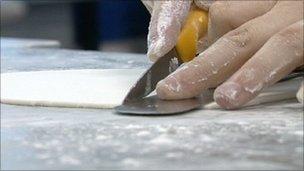Crackdown on school league table tricks
- Published

Many vocational courses are highly valued
The government is to crack down on school league table tricks by cutting the value of vocational qualifications in performance measures.
Known as equivalent qualifications, some of these count for as much as four or even six GCSEs.
This creates "perverse incentives" for schools to offer them and thereby boost their league table position.
From 2014, only "high value" qualifications will count, and on a one-for-one basis with academic ones.
The number of equivalent qualifications taken in schools has exploded in recent years from 15,000 in 2004 to 575,000 in 2010.
Some have such a high equivalency with GCSEs that pupils could conceivably take one of these qualifications, plus English and maths GCSE, to be counted for the school benchmark of five good GCSEs including English and maths.
Professor Alison Wolf, who conducted a review of vocational qualifications for the government, suggested the high points value of equivalent qualifications gave schools "perverse incentives" to offer them.
But now the Department for Education has set out strict new criteria so that what it says are only valued vocational qualifications are recognised in the tables.
Qualifications will only count if they are GCSE-sized or bigger, have a substantial external assessment and require knowledge across the subject and have a range of grades for pupils to obtain.
The department estimates that the 7,000 qualifications that currently count in league tables will be reduced to just a few hundred. They will be the most rigorous courses that are of real value to students, it says.
Schools Minister Nick Gibb said he wanted to be sure that the vocational qualifications taken by 14 to 16-year-olds genuinely lead to further education and are valued by employers.
"No pupil should be preparing for a vocational qualification simply to boost the schools 'GCSE or equivalent' score in the performance tables.
"These reforms introduce a systematic and fair set of rules that will determine which of the many thousands of qualifications taught in schools can be included in performance tables for 2014 onwards.
"They will lead to a boost in the quality of vocational qualifications being taken and will enhance the opportunities for young people to progress."
'League table points'
The shake-up follows Prof Wolf's report on vocational qualifications which said schools had been tempted to teach qualifications that attract the most points in school performance tables.
She warned that these equivalences created "perverse incentives" for students to be steered into notching up qualifications which may not help them into work or higher education.
She added that the "staple offer" for a large chunk of sixth-form students was a "diet of low level vocational qualifications".
The Department for Education will set out in early 2012 which ones will still count in performance tables from 2014.
Rod Bristow, president of Pearson UK which accredits vocational BTec qualifications, welcomed the move.
He added: "Independent research has shown that BTecs are rigorous and valuable qualifications enabling students to go on to top universities and great jobs, but we are always looking to raise the bar.
"We have been working collaboratively with schools and colleges and are introducing elements of external assessment into BTecs from 2012."
He said BTecs were high value and well regarded and should continue to be recognised.
Shadow education secretary Stephen Twigg said greater rigour in vocational qualifications was essential for achieving high standards and that Labour supported this.
"However, addressing shortcomings in the rigour of some qualifications should not be at the cost of undervaluing existing successful vocational programmes, such as those listed by the Royal Academy of Engineering," he added.
"This announcement highlights the contradiction at the heart of this government's education programme. On the one hand, continuing the University Technical College (UTC) programme to recognise the crucial role Vocational Education should play in rebalancing the economy. On the other hand, Michael Gove is undervaluing the vocational qualifications that UTCs and others provide, showing he is out of touch."
David Harbourne, director of policy and research at vocational education charity Edge, said: "By saying that even the most substantial vocational qualifications will only count as equivalent to one GCSE, the government is sending a signal that vocational qualifications don't matter.
"We're very worried that schools will drop vocational subjects, even though learning by doing is an important way of preparing young people for the future."
- Published10 October 2011
- Published3 March 2011
- Published9 September 2010